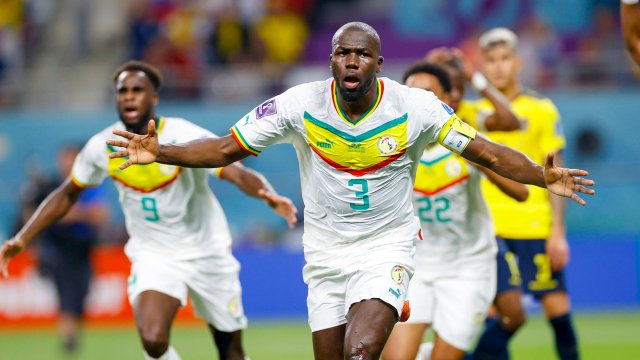Ademola Lookman has emerged as Nigeria’s standout performer in the knockout stages of the Africa Cup of Nations (AFCON), single-handedly spearheading their campaign with stellar performances.
Despite not being born in Lagos or Abuja, Lookman’s roots trace back to England, where he grew up and attended school in Peckham, south London.

He is not alone in this narrative at AFCON this year. Players like Kalidou Koulibaly, Senegal’s captain, and Sebastien Haller, Ivory Coast’s talisman, share a similar background.
Born in France, they represented the country at youth-team levels before donning the colors of their ancestral nations.
Surprisingly, about a third of the 629 players participating in the tournament were born outside Africa.

Cape Verde’s squad, for instance, boasts 25 players hailing from six different countries, while Algeria and Cameroon feature a significant number of squad members raised in France.
The influx of foreign-born players at AFCON reflects a broader trend rooted in historical and socio-economic contexts.
Dr. Gerard Akindes, a professor with expertise in African sports, notes the colonial legacy and economic hardships that prompted migrations, particularly in the 1970s and 1980s.
“The International Monetary Fund (IMF) and World Bank policies affected African economies, driving migrations as a means of survival,” explains Akindes. “France, with its language and welcoming system, became a popular destination.”
This trend hasn’t escaped the attention of national football federations. The Royal Moroccan Football Federation (RMFF), for instance, strategically scouts talent in European countries with large diasporas, evident in Morocco’s diverse AFCON squad.
Morocco’s head coach, Walid Regragui, embraces this diversity, emphasizing that every player, regardless of birthplace, embodies Moroccan spirit and commitment.
This sentiment echoes across teams like Nigeria, where a strong British core has propelled their success in the tournament.
However, foreign-born players’ integration isn’t without challenges. Radhi Jaidi, Tunisia’s most capped player, acknowledges the positive impact but stresses the importance of cultural understanding and adaptation.
He highlights the need for formal education sessions and teammates’ support to facilitate integration.
Yet, the reliance on foreign-born talent underscores deeper issues within African football, including the decline of domestic leagues and the exodus of young talent due to resource limitations.
While foreign-born players enhance team quality, they also mask systemic failures in talent development.
Ultimately, the presence of foreign-born players at AFCON sparks debates around identity, allegiance, and representation.
As players navigate complex narratives of heritage and belonging, fans embrace them for the value they bring to their teams, heralding a new era of diversity in African football.
As the tournament progresses, with Nigeria eyeing victory against Cape Verde the narrative of foreign-born players like Ademola Lookman and William Troost-Ekong continues to captivate fans, transcending borders and enriching the tapestry of African football.
















Comments 1